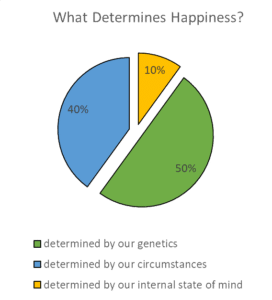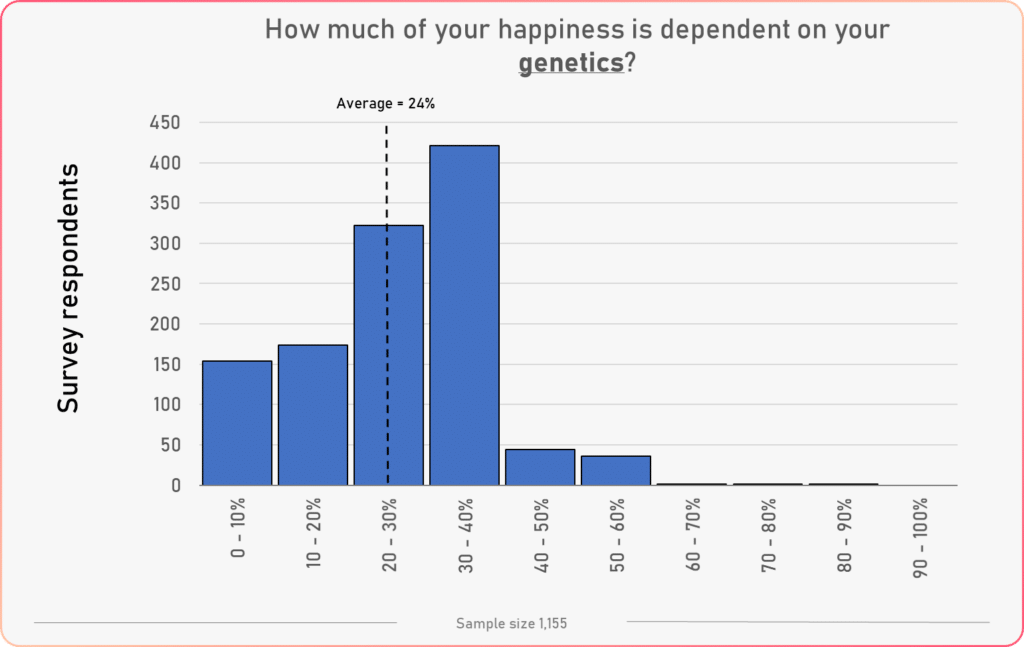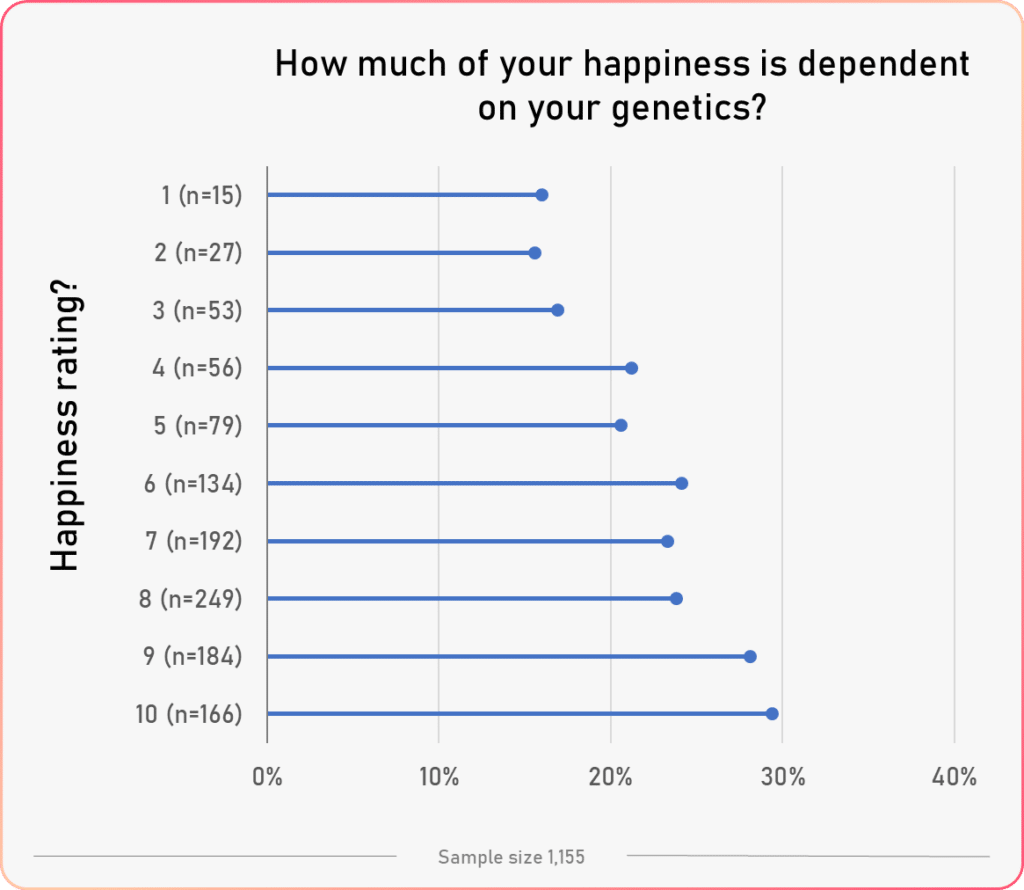Can happiness be genetic, and if so, how much of it is determined by our DNA? This question has been discussed for years, not only because it’s a delicate topic, but also because there is a lot of misinformation that is disproportionally believed to be true.
We can’t change our genetics, and therefore, we can’t change a part of our happiness regardless of how much we want to. Even though the correlation between genetics and happiness has been studied a lot over the years, there still doesn’t seem to be a single right answer. How much is determined by our genetics, and how much can we actually influence ourselves?
This article aims to summarize all existing study findings to show you what part of your happiness is really determined by genetics.
How much of your happiness is determined genetically?
There have been multiple studies that have found an interesting correlation between our genetics and our happiness. Most studies look at the similarity of happiness – or subjective well-being – between groups with similar DNAs.
Studies on siblings, fraternal twins and identical twins
Identical twins are known to share 100% of their DNA, whereas fraternal twins share 50% of their DNA. This is the same as ordinary siblings.
Based on this fact, multiple researchers have studied the similarity of happiness between groups of people with differing and similar DNAs.
1988 study
This was first done in 1988, where a study performed a questionnaire with the following participants:
- 217 identical twins
- 114 fraternal twins
- 44 identical twins, but raised apart from each other
This study found that DNA was responsible for 39% to 58% of our happiness.
Perhaps more interestingly, the study found that the difference between twins raised together and twins raised apart was minimal. In other words, our upbringing doesn’t impact the amount of our happiness that is part of our DNA.
1992 study
A study released in 1992 looked at 175 pairs of siblings in regards to their behavior and temperament. It found that 35% to 57% of the siblings’ behavior could be explained by genetic variances.
And just like the 1988 study, it found that the environment in which the children were raised in did not have a significant influence on the results.
1996 study
Another study performed in 1996 – by the same researchers as the 1988 study – found similar results. The researchers asked thousands of twins for their well-being and found that their genetics accounted for 44% to 52% of its variance.
More interestingly, they retested some of the people they initially surveyed, they found something more interesting. Over time, they found that there is a stable component of our happiness that is determined much more by our DNA. The researchers estimated that as much as 80% of our (stable) happiness can be determined by our DNA.
The well-known 50% rule
In 2005, Sonja Lyubomirksy, a professor of psychology, published the book “The How Of Happiness”. This book is primarily about what factors determine most of our happiness, and the author uses the 50-40-10 rule to explain it.
The 50-40-10 rule of happiness goes as follows:
- 50% of our happiness is determined by our genetics
- 10% of our happiness is determined by our circumstances
- 40% of our happiness is determined by our internal state of mind
The book includes a pie chart similar to the one visualized below:

This book became very popular over the years, leading to many people believing that 50% of our happiness is genetic.
However, the scientific community does not whole-heartedly agree with this common belief.
In fact, an entire paper was dedicated to explaining the many issues that pop up with this 50% rule. Unfortunately, it doesn’t provide an answer to the question that naturally follows up: How much of our happiness is really determined by our genetics then?
The happiness gene
A fascinating study released in 2011 might have the answer to this question. The study found that one particular gene (5-HTTLPR) is associated with an increased feeling of happiness.
The study included over 2,000 Americans, and they were asked the following question:
How satisfied are you with your life as a whole?
It found that people with the 5-HTTLPR gene were >50% more likely to answer that they were satisfied with their lives.
This shows that there certainly is a genetic part of our happiness that we are born with (or not).
How much of our happiness do we think is genetic?
In 2020, we published the results of a survey we performed ourselves. We wanted to know how much people think their happiness is genetically determined.
We found that – on average – people believe that only 24% of their happiness is determined genetically.

Our survey questioned 1,155 respondents on their happiness, by asking a very specific question:
If you look back at the last year of your life, how much of your happiness was dependent on genetics, circumstances and your internal state of mind?
Each of the 1,155 respondents provided answers based on a range from 0 to 100%, with intervals of 10%.

(A footnote was added that reminded respondents that the total of all 3 factors must add to 100%. When the total didn’t match 100%, the individual factors were scaled up or down pro-rato, so that the total would match 100%.)
Of course, we wanted to find out how much our beliefs are influenced by our circumstances. In other words, are some people more likely to believe that their happiness is genetically determined?
For example, we found that happier people believe that a bigger part of their happiness is genetically determined.

This shows a positive correlation between how happy people are and how much of that happiness they believe is a result of their genetics.
In other words, the happiest people in our dataset (happiness rating = 10) believed that 29% of their happiness is genetical. On the other hand, the unhappiest respondents (happiness rating = 1) believe that just 16% of their happiness is genetical.
What does this data imply? That is a difficult question.
On one hand, it seems that people who believe a bigger part of their happiness is genetic are also more inclined to actually be happier. You could say that if more of your happiness is determined by your genetics, the happier you actually are. In a way, this makes sense, because that would leave less of our happiness dependent on negative external circumstances.
But on the other hand, this could also mean that happy people are more inclined to take credit for their happiness by explaining “it is who I am”, instead of giving credit to their positive circumstances for example. This type of thinking can be explained by the self-serving bias.
Wrapping up
In the end, it’s impossible to determine on a personal level how much your happiness is determined genetically. It may be as high as 80% for you, even though you believe it’s only 20%. However, you shouldn’t feel limited by your DNA in your pursuit of mental well-being and happiness. There is always going to be a part of your happiness that is influenced by your internal state of mind and your circumstances.
What did you learn? Do you now have a better idea of how much our genetics influence our happiness? Was there something I missed? I’d love to hear about it in the comments below!


Amazing! I am 86 and was just told by a nurse while I was in cardio-rehab that I probably have the happiness gene! I don’t remember ever being depressed. I hope I passed it along!